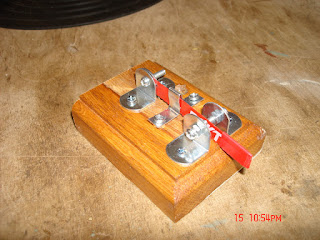I got a shock today when looking at my blog and realised that I hadn't populated it since September 2020! In my defense I have not been doing very much radio work at all, just the occasional listen and that's about all. Now the New Year is coming up fast I have promised myself to get back in to radio work, in particular get back in to some CW and also try out some more home brew antennas.
So I have started building a Dave Tatlock (KG0ZZ) 40/80/160 inverted V antenna. I do have the old W3DZZ, but it is old and so needs replacing and I'd like to have an antenna that covers 160, so this new inverted V seems just the job. Currently I am building the four coils, (evidently not traps, but coils), something I need to look in to more to find out the difference. I built a few traps particularly coax traps but no coils, so this should prove interesting.
I've cut the four tubes, with two different lengths, the PVC circumference is 1 1/4" or 40mm, of which one is 4 1/4" in length and the other is 7 1/4" or 11cm and 18.4cm and have inserted the two end bolts to take the coil wire ends which will connect the coil wire to each element. I've also drilled out the holes for the elements wires to fasten the coils, but that is as far as I have got as I'm still awaiting the actual 18 AWG magnet wire. In the picture below, the white tube was the initial test piping for checking measurements and drilling any sample holes.
Each coil will then need winding, which should prove interesting as the smaller tube requires 50 turns of the 18 gauge wire and the larger will need 123 turns! The secret for any winding I find, is patience and plenty of masking tape so if you have to do something else or are interrupted whilst in mid turn, you can just tape up writing the number of turns on the masking tape. Believe me, it actually works!
The lengths of the elements seem simple enough, 40 meters is 35' 10" or 10.922 m. 80 meters is 14'9" or 4.55m and 160 meters is 8'10" or 2.7m. I'm using an old extension lead (25m) and have already remover the plastic cover so that I now have x3 wires which should provide more than enough length to cover all the elements. The lengths I've given are approximate and the finished antenna will require tuning I suspect....More to follow once I have received the 18 gauge wire.
The first batch of 18 AWG wire has arrived so I've made a start on the winding's. Measuring and counting is the key as well as patience, you have to allow that things don't always run smoothly, especially the 123 turns for the 160 coil, which can prove quite demanding! Well, I've managed three coils and have run out of 18 AWG wire so have ordered some more but it's going to take at least a week to arrive, so on with some measuring of element cable. Remember measure loads of times and cut only once!

The second batch of 18 AWG wire arrived today and finally I have completed the coils. I have also managed to heat and remove the enamel of all ends so that I can attach them to their respective bolts. So they are now ready to be fitted to each element once I have measured and cut. Then I suspect the fun will start with trimming and tuning! Dave in his video reckons the coils and element lengths should be pretty accurate, but I have a feeling with the housing earth wire I'm using, things are going to need some trimming, but hopefully not adding!
I've got plenty of time as my new 30' mast doesn't arrive till February and therefore I can get things roughly set up, but cannot test properly till then.
I couldn't wait for the new mast so I built a temp one instead and after assembly the antenna was hoisted up to around 30ft. First results are pretty good, the SWR readings are not perfect at the moment but I've yet do do some fine tuning.
Top band is reading 1.1 at 1.817 which is right on the CW part of the band.
Eighty metres, is 1:1 at 3.688 and forty is 1:1 at 7.177. So first tests are pretty good. My only negative thoughts would be the SWR rises fairly quickly as you move up and down each freqs. Top band I can understand but 40 and 80 I thought would be better, e.g 1.6 by 7.220 and 1.6 by 3.7070. More playing and testing is obviously required.






















